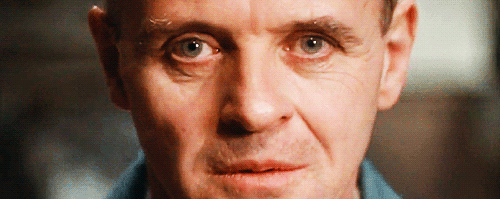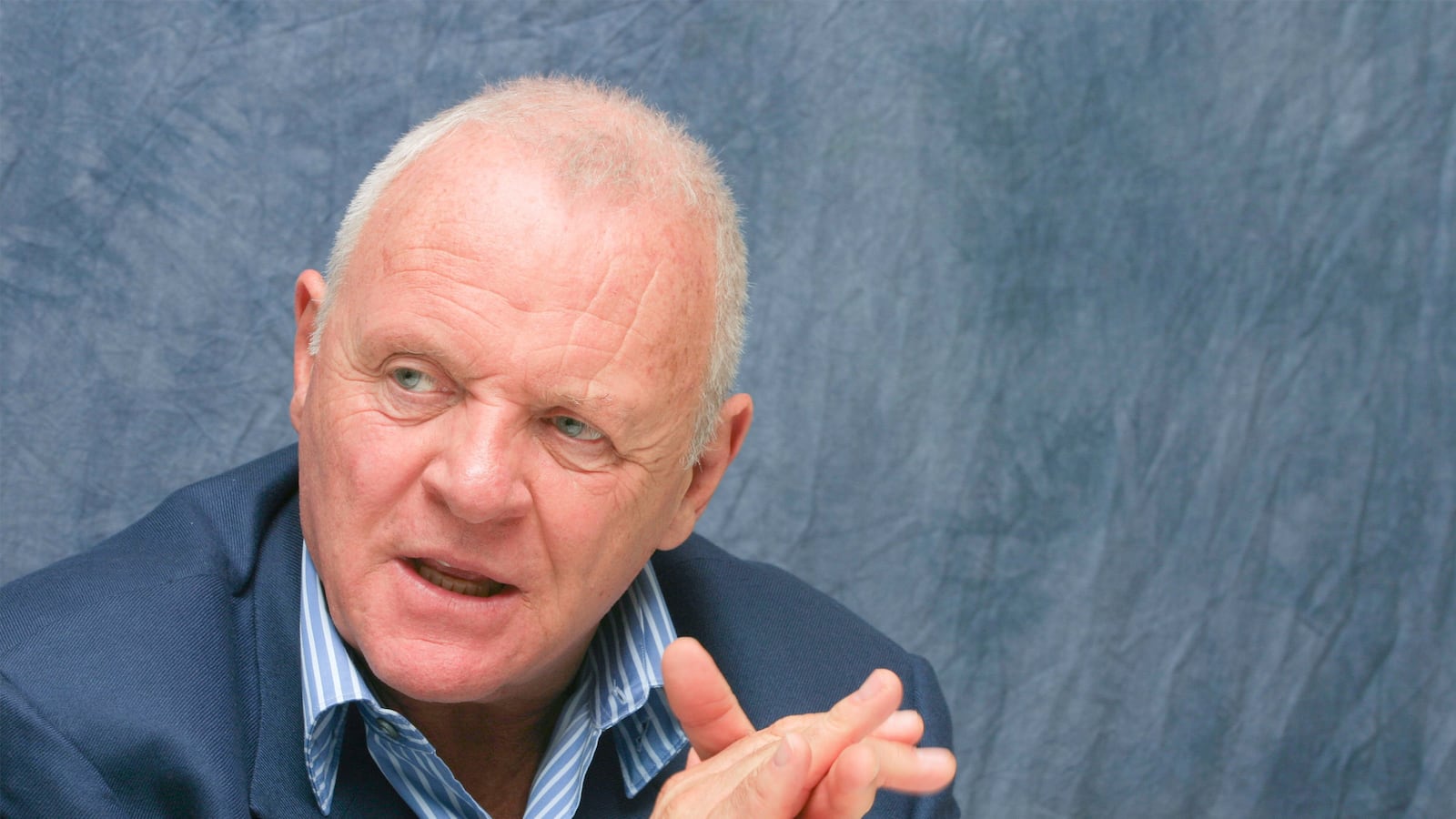Welsh actor Sir Anthony Hopkins—Oscar-winning lion of the screen, three-time BAFTA winner, two-time Emmy winner, the erstwhile Hannibal Lecter, and a bona fide knight of the British Empire to boot—walked out on the theater life over four decades ago in a blaze of glory, quitting his star turn as Macbeth in the middle of his run at the National Theatre.
The legendary Laurence Olivier had given the former baker’s son from Glamorgan his break by inviting him into the theater company housed at the Old Vic, the London institution long synonymous with William Shakespeare. But Hopkins, then a younger man, and one who still drank heavily, was restless—a word he still uses to describe himself—and he fled, leaving the stage in his rearview as he dove into movies and gravitated toward Hollywood.
So it’s no accident that Hopkins comes full circle in Starz’s The Dresser, a powerful new adaptation of Ronald Harwood’s 1980 backstage play about an aging actor mulling his life and relationships one night during a performance of Shakespeare’s King Lear.
In it he plays “Sir,” a once-legendary thespian reduced to performing the classics on a regional tour with his hardscrabble company during WWII. Outside, the Blitz is wreaking havoc on London and death hangs in the air. The wailing of sirens pierce the theater walls as bombs rain dust and debris down on performers. But within this theater, on this night, the show must go on.
Even if its star is nowhere to be found.
“I knew that kind of dedication that Sir had to his art, and to playing Lear, was something that was a powerful drive in his life,” Hopkins told The Daily Beast. “And I wanted to figure it out for myself because I left the theater many years ago and did films, and some films are good and some are not so good. You’re accused of selling out and throwing your career away.”

Director Richard Eyre (Iris, Notes on a Scandal) opens his version, based on Harwood’s original play, on a note of impending panic. Sir is missing, last seen stomping on his own hat in public—a sure sign of madness, senility, or worse, that he won’t be able to perform—leaving his longtime dresser Norman (Ian McKellen) to reassure everyone not to worry.
“I hadn’t worked with Ian before, but I’ve known him over fifty years!” Hopkins said of McKellen, who’d been with him in the National Theatre all those years ago. In The Dresser, they masterfully push and pull against one another as the volatile but brilliant star and his devoted assistant, an inspired pairing that unites the two stage and screen icons for the first time. “I got the idea, I asked my agent, “Is it possible to do The Dresser as a movie? Would Ian do it?’ He said yes, and it’s been a highlight of many years in this business to work with McKellen. He’s a great actor.”
The film also demanded that Hopkins, now 78, essentially play two roles. As Sir, he veers from feeble and disoriented to melancholic and pensive backstage, a man suddenly weighing a lifetime of relationships and regrets. But when Sir dons his makeup and crown and roars onstage to play King Lear for the 227th time, Hopkins rages with tremendous fury that captivates his audience—and, he says, stirred something deep within him.
“It seemed a good test for me, to see if I still had the strength and the power to do those classic pieces like King Lear,” he explained. “And I felt like during the production and the filming that I did have all that energy left, and that I hadn’t lost it—in fact, it had grown in the years, the muscle and the power to do those sorts of scenes and performance… so much so that when I was doing King Lear onstage in the theater for the film, Richard Eyre and [producer] Colin Callender said, ‘You should do Lear again.’”
“I did it once years ago, but I was too young,” mused Hopkins. “Well, I was okay. But now I’m at the right age to do it. So I’m going to do it in London, probably early next year! I’m really looking forward to it, because now I know the man. Now I know how to play it.”
Hopkins as Sir as Lear delivers a commanding performance of the storm scene, in which Lear wanders into the night after entrusting his kingdom to the wrong daughters.
“He goes out in his banishment in a storm and it’s unleashed a storm inside him, and he discovers in a moment, he says, ‘God’s given me that patience,’” said Hopkins. “And in that moment, doing it onstage in The Dresser—‘Give me that patience’—I suddenly stopped. It’s patience. My impatience has destroyed my life.”
“It comes out of the very center of his soul, asking God for patience because impatience that has destroyed him and caused a civil war. It’s just a human frailty, we’re all impatient for something. But with Lear, it’s monumental. But then through that he finds the grace of insanity and the grace of God, or whatever you want to call it. He becomes awake.”
Hopkins, who was Oscar-nominated for his portrayal of embattled United States President Richard Nixon in Oliver Stone’s Nixon, says modern politics—particularly during the current race to the White House—could learn something from Shakespeare’s great tragedies.
“Shakespeare was such a contemporary. What his genius was, 500 years ago, was digging down into the depths of human passion, of human frailty, of human fault—and that power and ego are two of the greatest killers,” he said. “You look at somebody like President Nixon, who was a brave man but through emotional wreckage in his own life was destroyed by his own vanity, his own egotism, his own paranoia, and destroyed his own presidency. It’s enormous!”
“It’s in modern politics today, and in decisions everyone makes in life,” he continued. “We can either make it lead them on to revenge and to teach people lessons, or we can say maybe there’s a better way through this and understand that everyone is fighting a great battle. Lear’s mistake is he has no patience for anybody. He wants to be right, which is part of human nature. People want to be right. They don’t want to be wrong. They want to be perfect. We want to be the best, but of course that’s not possible.”
Not that Hopkins, who has dual citizenship and lives in Malibu, has been glued to his television during the run-up to the election. “I can’t watch cable news because it’s all shouting on the screen!” he laughs, “and I just don’t have any time for it.”
Hopkins famously fanned out on Breaking Bad in a letter to Bryan Cranston after binge-watching the AMC series in a matter of weeks. “That was one of my favorites!” he said.

But he’d really rather spend his days by the ocean, pursuing other passions. “I don’t really watch anything. I’m too busy painting or writing music. I play the piano—that’s my hobby.”
That “hobby” is more like a lifelong side career; he’s had his symphonic compositions performed all over the world and once hit #75 on the UK singles chart with his 1986 spoken word tune “Distant Star.”
“I play the piano every day,” Hopkins enthused. “I play Gershwin and Chopin, people like that. But I haven’t written for a few years. And I sell paintings in Las Vegas and Hawaii and Aspen and Texas, places like that. People say, ‘What do you paint?’ Well I don’t know! I just paint and hope for the best and it seems to work out.”
Hopkins, who once dated Martha Stewart and has a daughter from his first marriage, has long described himself as a sort of loner, despite the natural affability and playfulness that comes easily in conversation. He’s been married to Stella Arroyave since 2003, and once, a few years back, described his perfect night as “Staying in and watching Mob Wives on TV.”
“I don’t hang out with the acting business,” he explained, “and the friends I have are my wife’s friends. Spanish women, from Colombia, Mexico… I hang out with them. But I don’t have any friends of my own. I don’t hang out with actors. It’s just in my nature.”
“I’m friendly! I’m okay,” Hopkins assured me. “My wife says, ‘Why don’t you have any friends?’ I don’t know, I’ve got enough going on in my life without hanging out with actors all the time or hanging out with anyone very much.”
“I love working and I’m not lonely, I’m not a recluse, but I am very much my own person.” He paused, searching for the words as if he finds himself explaining this all the time to folks who can’t fathom his solitude. “I don’t need people much.”
Hopkins says he might soon pick up writing the memoir he started years ago. Or maybe not.
“You know, I have a good life,” laughed Hopkins. “So acting isn’t the end of it all.”






